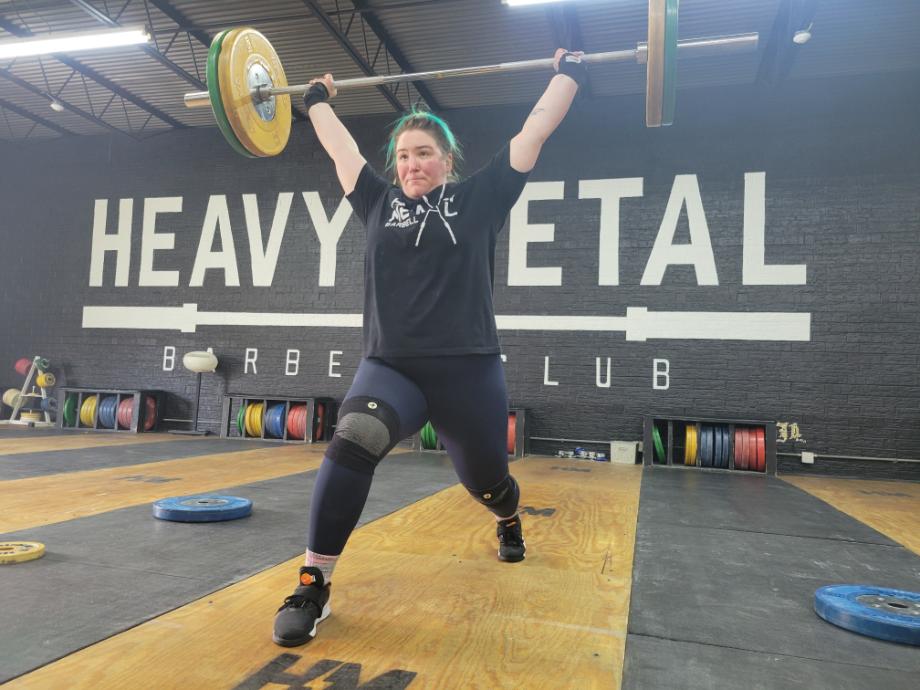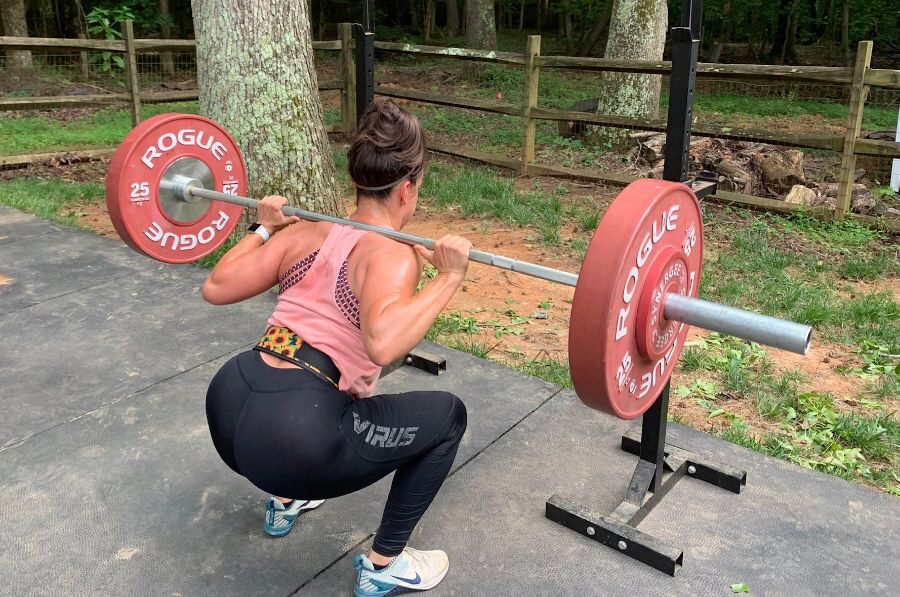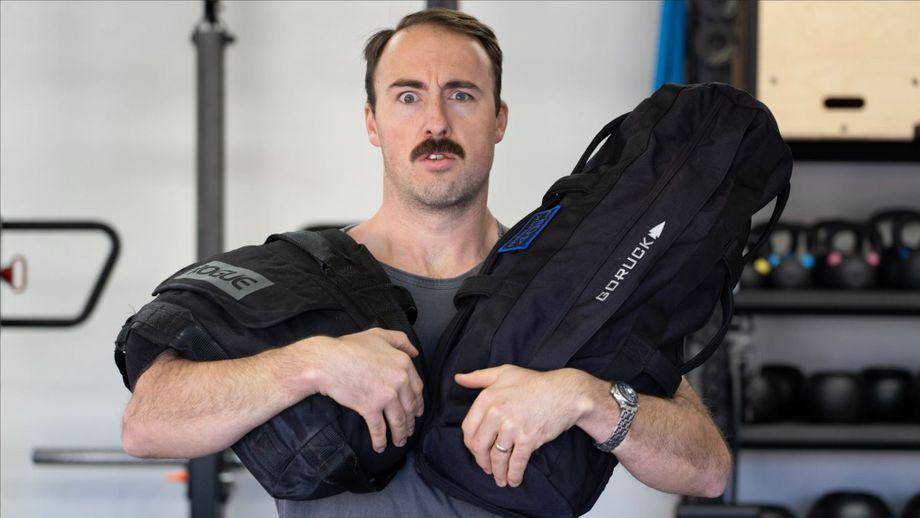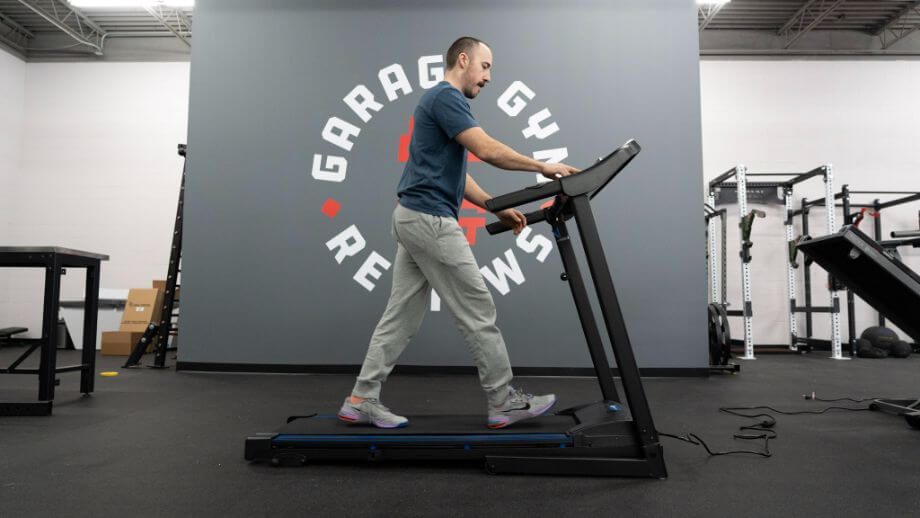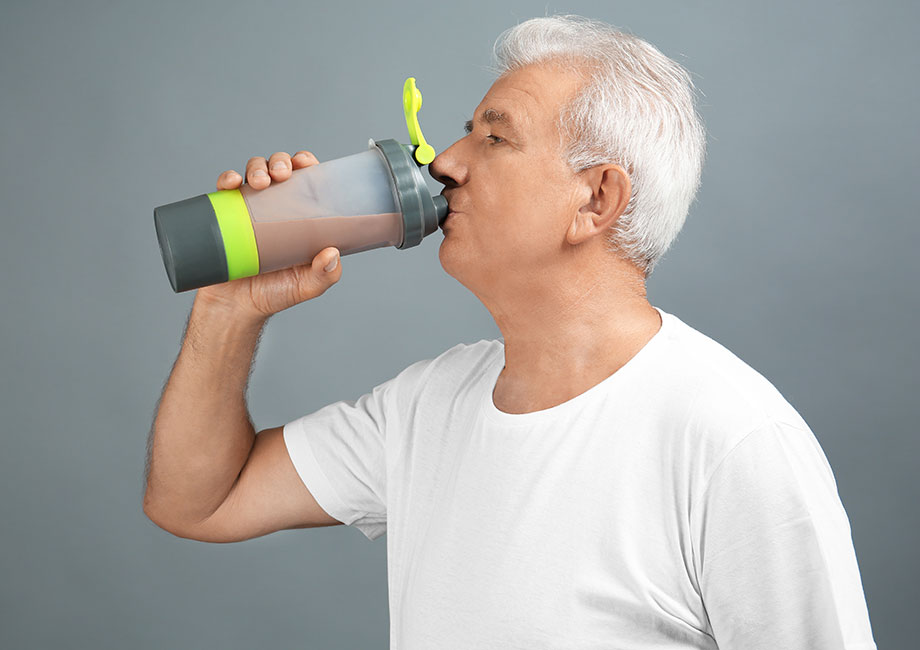As a competitor in the sport of weightlifting for the last 25 years, you could say I have an affinity for the best weightlifting shoes on the market. From budget-friendly pairs of lifters by small brands to the high-end premium lifting shoes from Nike, Adidas, or Reebok, I’ve tried just about all of them—including wearing a pair of Nike Romaleos while I competed at the Tokyo Olympics.
RELATED: Nike Romaleos 4 Weightlifting Shoes Review
However, weightlifting shoes can be expensive—the Romaleos and the Reebok Legacy Lifter 3 cost $200 or more. It’s hard to drop that money on a new pair of shoes just to see if you’d like Olympic weightlifting in your training program.
Fortunately, there are budget-friendly alternatives like Reebok’s own Lifter PR 3…but does this shoe handle as well as premium lifting shoes for squats, Olympic lifts, and other strength training exercises? How does it stack up in terms of versatility? We’ll answer these questions and more in this Reebok Lifter PR 3 review.
Expert Lifting, Expert Reviews
When it comes to our reviews of home gym essentials, we have experts in the fitness industry test out the latest cardio and strength equipment, along with apparel and accessories. Our experts include certified personal trainers, nationally and internationally competitive athletes, and weightlifting coaches—who all know what to look for in garage gym equipment.
Our product tester for the Reebok Lifter PR 3 was my wife, Emelie Wilkes—she’s great, and I’m not biased at all. Not only is she a great partner in life, but she’s also an accomplished Olympic weightlifter and USA weightlifting coach, earning national-level medals and competing internationally during her 12-year lifting career.
In particular, she’s had experience with Reebok shoes, as her preferred shoes currently are the Reebok Legacy Lifters.
In her testing of the PR 3s, Emelie looked at features of these budget-priced shoes according to our fitness equipment testing methodology and rated aspects from 1 to 5, including categories such as:
- Appearance and design
- Construction and durability
- Stability
- Versatility
- Adjustments and comfort
- Overall value
Reebok Lifter PR III
Reebok Lifter PR III
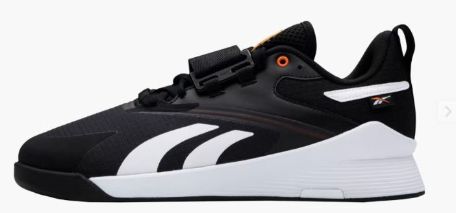
Product Highlights
- 18mm heel-to-toe drop
- Around $100
- Imported
- Rubber outsole
Pros & Cons
Pros
- 18mm heel-to-toe drop
- Rubber outsole for traction
- 5 colorway options
- Affordable for a weightlifting shoe
Cons
- Not a versatile shoe
- Midsole is too responsive for heavier lifts
- Heel cup may deteriorate
Bottom Line
An incredibly affordable weightlifting shoe that's good for one thing—weightlifting.
A Quick Look at the Reebok Lifter PR 3
The Reebok Lifter PR 3s are the latest iteration of the company’s budget-friendly weightlifting shoe that can be used for a bit more than just deadlifts and squats. With a stable base and raised heel, these shoes are great for snatches and clean and jerks, too. However, they have a responsive midsole, which makes them a bit more versatile than most lifting shoes—closer to the Reebok Nano cross-training shoes, although not quite as responsive.
RELATED: Reebok Nano X4 Review
Rogue’s website has the shoes’ effective heel height listed at 18 millimeters, but the pair Emelie tested has written on the heel (literally) a heel height of 15 millimeters. You can see this in the images on Rogue’s page as well.
With an elevated heel, this shoe is made for strength training, although the 15-millimeter heel height is probably less than most Olympic weightlifters are used to. Most lifting shoes have an effective heel height of 20 millimeters; the Reebok Legacy Lifter IIIs are even higher at 22 millimeters.
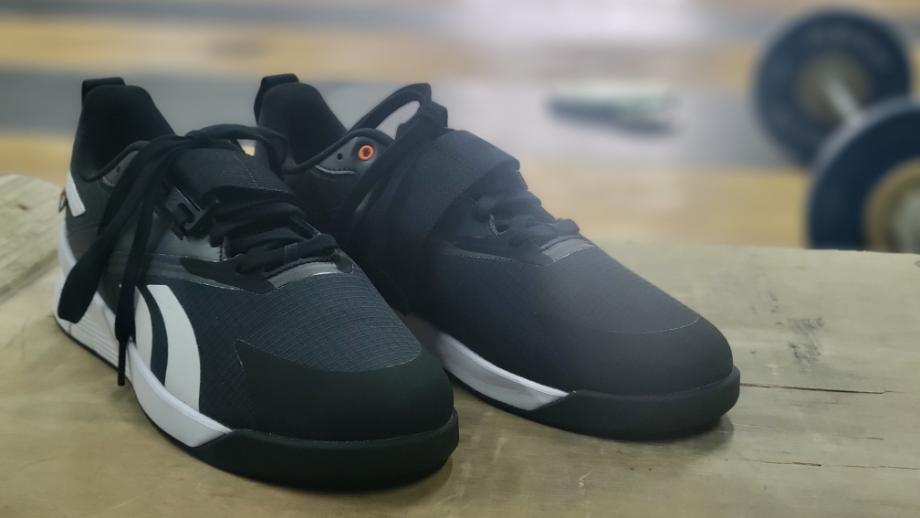
Before You Buy
- Very recently, you haven’t been able to find these shoes on Reebok’s website, only on Amazon and Rogue Fitness, which means we may be seeing a new generation of budget lifters from Reebok soon.
- While normally marked at $110, these shoes are often on sale for as low as $80, which is what Emelie was able to find them for.
- Emelie notes in her testing of the shoes that the toe box is pretty wide, which is nice if beginners are looking for a wide toe box similar to the TYR L-1 Lifters, but without the lofty price tag.
Is the Reebok Lifter PR 3 Worth It?
With most dedicated Olympic lifting shoes costing between $200 and $230, the Reebok Lifter PR 3 is a steal at $110, earning it a value of 5 out of 5. The shoe is comparable to the Nike Savaleos and the Adidas Powerlift 5, with a slightly responsive midsole and 15-millimeter heel-to-toe drop.
That said, if you’re looking for a shoe for heavy lifting, it might be worth it to invest in a higher-end lifter. The responsive EVA foam midsole adds to the versatility of the Lifter PR 3s if you’re doing a CrossFit workout, but it will impact your overall stability on maximal snatches or squats. They’re not running shoes, though; the rubber outsole and elevated heel won’t feel great on any sort of extended run.
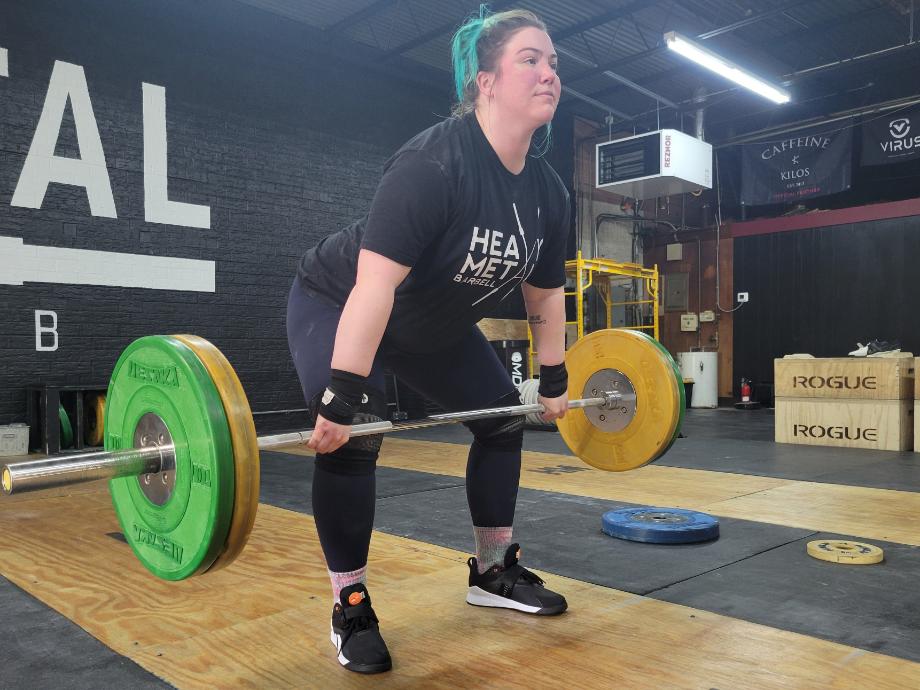
Great for:
- Beginners in weightlifting
- People looking for budget home gym equipment
- Lifters with good ankle mobility
Not recommended for:
- Dedicated Olympic weightlifters
- Those who prefer a higher heel height for lifting
- Anyone wanting a cross-trainer that would work for lengthy runs
Reebok Lifter PR 3 Specs
| Price | $110 |
| Heel-toe drop | 15 mm |
| Size range | Men’s 7-14 (Women’s 8.5-15.5) |
| Upper | Breathable textile |
| Midsole | EVA foam |
| Outsole | Rubber |
| Colorway options | Court Brown/Black/White; Black/Pure Grey/Reebok Lee; White/Black/Gum; Black/White/Smash Orange; Black/Pure Grey/Gum |
Using the Reebok Lifter PR 3
My wife Emelie Wilkes, USAW-L1, used the Reebok Lifter PR 3s through several workouts across a 2-week period, performing tons of Olympic lifts and accessories—squats, pulls, and deadlifts. As she is used to strength training, she noticed the responsive midsole almost immediately. “I feel springy,” Emelie said on her first day, “but I don’t think that’d be good for heavy loads.”

She worked up to about 80% of her best in the snatch and clean and jerk—around 165 and 200 pounds respectively, and did back squats well over 300 pounds, so these budget-friendly shoes can still handle some weight.
RELATED: How To Increase Strength
Let’s look at how these weightlifting shoes fared in other aspects.
Construction and Durability
The Reebok Lifter PR 3s are made with a breathable textile upper and an EVA foam midsole, making it a fairly light shoe, even with the dense rubber outsole.
“The materials used here are lighter than the ones I’m used to,” Emelie says, although she adds that it’s not a bad thing. “It just took a bit of getting used to,” she explains. In weightlifting, you’re moving your feet for the snatch and clean and jerk, so you’ll want something lightweight to move easily, but still stable enough to remain grounded on the floor.
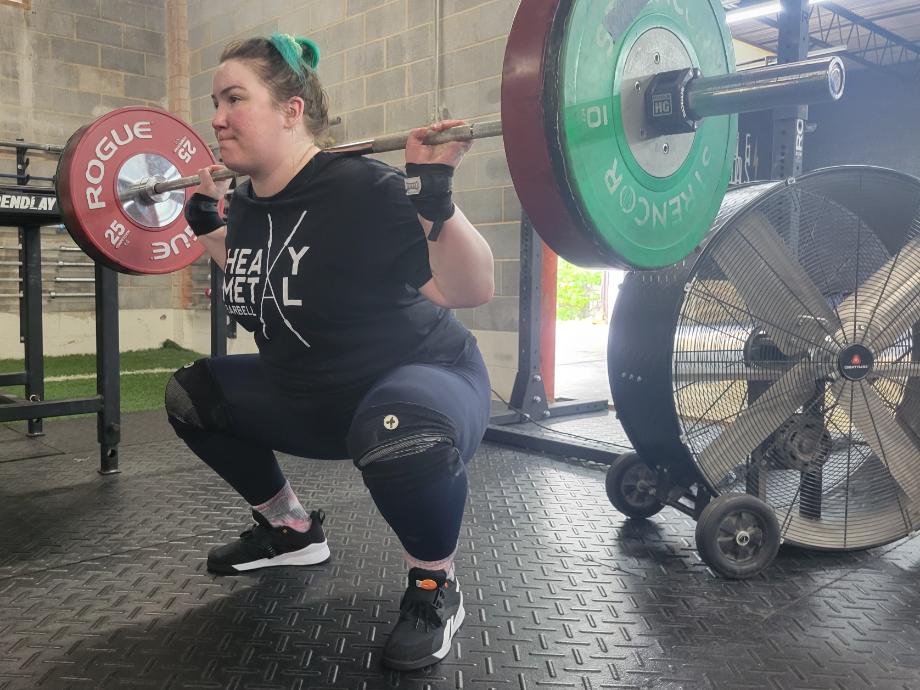
The shoes are built solidly, but with the lightweight materials, long-term durability will be an issue—especially with a budget pair of shoes. While two weeks isn’t enough time to test longevity of lifting shoes, Emelie had the same concerns, saying, “I worry about the upper on budget shoes like these lasting, especially for a lifter who is using these shoes regularly.” She rates the durability and construction of these shoes a 4 out of 5.
Appearance and Design
Coming in five different colorways, the shoes are pretty stylish—for weightlifting shoes. Emelie got the black and white colorway with orange highlights, and says about them, “The shoes were pretty nice-looking.” She does add, however, “The shoe tongue seemed large and aggressive to me, once I had the shoes all cinched up. That didn’t look too appealing.” The shoes get a 4 out of 5 for the appearance.
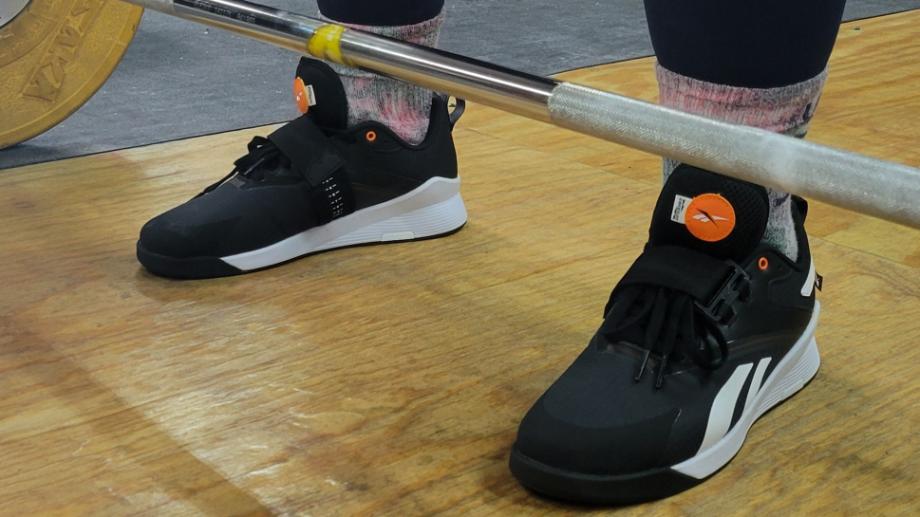
Stability and Performance
The stability of the shoes are decent, earning them a 4 out of 5. Emelie felt pretty solid while lifting in the lifters, but the reason they weren’t rated higher is because of the EVA foam midsole. The responsiveness—which adds to the shoe’s versatility—also makes the shoes less stable at heavier loads.
“These shoes are a bit more responsive than you’d usually want a dedicated lifting shoe,” Emelie says. “As a budget shoe or cross-training shoe, this should still be fine,” she adds. Removing the insole from the shoe might help, but if you’re wanting a dedicated lifter for maxing out lifts, you may need to look elsewhere.

The effective heel height of the shoes is 15 millimeters, which is lower than most high-end lifting shoes at 20 millimeters. This isn’t a dealbreaker, but if you have ankle mobility issues while squatting, you may need a higher heel height.
RELATED: Squat Anatomy
Versatility
Most lifting shoes don’t have a lot of versatility, since they’re made to do one thing, and that’s to lift heavy barbells and dumbbells. However, the Reebok Lifter PR 3s are lightweight and cushioned enough to have some decent versatility, earning them a 4.5 out of 5.
With the EVA foam midsole, these shoes are springy enough for barbell cycling, box jumps, and any other plyometric exercises you want to throw into a CrossFit workout. These aren’t running shoes, however; if you’re planning on breaking out into a mile run, you should switch shoes out.
Adjustments and Comfort

The shoes fit snug and secure due to their fit—and a velcro midfoot strap that keeps your foot in place. These shoes are also pretty comfortable, with a cushioned, responsive midsole; plus, the toe box should be suitable for wide feet. Emelie had a bit of trouble adjusting the laces initially, but she says, “Once I had them loosened properly they were fine.”
Reebok Lifter PR 3 vs Nike Savaleos
Nike Savaleos
Nike Savaleos Weightlifting Shoes
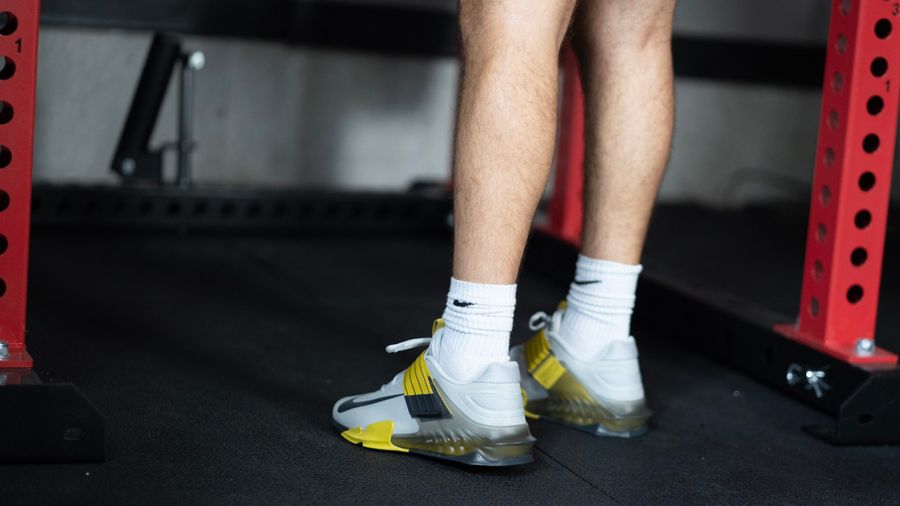
Product Highlights
- Weightlifting shoes
- 15 mm heel drop
- Wide toe box
- Hook and loop strap
Pros & Cons
Pros
- Great shoes at a great price point ($120)
- Wide toe box adds stability to lifts
- Good option for casual lifters and beginners
Cons
- Midsole might be too responsive for people who lift super heavy
- Moderate heel height (15 mm) doesn’t provide the best assistance for squatting
- Limited velcro surface area on straps
Bottom Line
If you’re looking for the best combination of function, style, and price, you can stop right here. The Nike Savaleos are by far the best weightlifting shoes for most people because of their value proposition.
Another budget-friendly pair of shoes is the Nike Savaleos, although which one may suit you will depend on what your training program typically looks like. While the Savaleos materials are a little vague, when I tested them out, the base was extremely solid—albeit it had a bit of responsiveness like the Lifter PR 3.
If you’re looking for a solid lifting shoe for a budget price, I think the Savaleos are the better choice. However, if you want a more versatile lifting shoe, the Reebok Lifter PR 3 is a better choice.
Check out my Nike Savaleos Weightlifting Shoes review for more of my thoughts.
| Reebok Lifter PR 3 | Nike Savaleos | |
| Price | $110 | $125 |
| Heel-toe drop | 15 mm | 15 mm |
| Size range | Men’s 7-14 (Women’s 8.5-15.5) | Men’s 5-15 (Women’s 6.5-16.5) |
| Upper | Breathable textile | Not disclosed |
| Midsole | EVA foam | Not disclosed |
| Outsole | Rubber | Not disclosed |
| Colorway options | Court Brown/Black/White, Black/Pure Grey/Reebok Lee, White/Black/Gum, Black/White/Smash Orange, Black/Pure Grey/Gum | Black/White/Gray Fog/Laser Orange, White/Black/Iron Gray, White/Metallic Gold/Wolf Gray/Photon Dust, Gray Fog/Clear Emerald/Total Orange |
Reebok Lifter PR 3 vs Reebok Legacy Lifter 3
Reebok Legacy Lifter III
Reebok Legacy Lifter 3
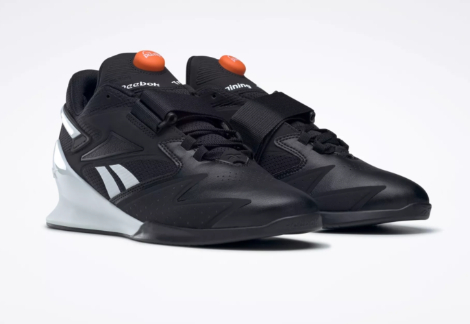
Product Highlights
- 22 mm effective heel height
- Midfoot strap and Reebok Pump keep your foot secured
- Available in multiple colorways for both men and women
- Durable material that’s built to last
- Best for Olympic lifting
- Not ideal for Crossfit or other types of metabolic conditioning training
Pros & Cons
Pros
- Supportive shoe that keeps your foot securely in place
- Durable material that's built to last
- Available in 5 colorways for men and women
- 22 mm heel height designed for Olympic weightlifting
Cons
- The heavy, sturdy design means these shoes aren't great for any kind of cross-training
- Sizing runs small, and you may have to order half a size up
- The cost is higher than similar weightlifting shoes on the market
- Women's colorways are a bit bland
Bottom Line
The Legacy Lifter III is the latest pure weightlifting shoe from Reebok. They have a durable design and 22 mm heel drop designed for weightlifting, with a midfoot strap and Reebok Pump system for added stability.
Compared to the Legacy Lifter 3, you can begin to see the different designs between a versatile budget lifting shoe and a high-end dedicated weightlifting shoe. First off, the Lifter PR 3 is half the price of the Legacy Lifters. Although they aren’t the most expensive pair of lifters (that award goes to the Adidas Adipower III), the Legacy Lifters are quite an investment at $220.
However, in use, the Legacy Lifters are a much more stable pair of lifting shoes. Plus, the higher heel height will put most people in a better position for overhead squats and clean and jerks. If you’re looking to use these lifting shoes for just strength training and Olympic lifting, it may be wise to save up and get a pair of lifters that’ll prove both durable and incredibly stable.
Read more in our Reebok Legacy Lifter 3 review.
| Reebok Lifter PR 3 | Reebok Legacy Lifter 3 | |
| Price | $110 | $220 |
| Heel-toe drop | 15 mm | 22 mm |
| Size range | Men’s 7-14 (Women’s 8.5-15.5) | Men’s 6.5-14, Women’s 6-12 |
| Upper | Breathable textile | Synthetic textile |
| Midsole | EVA foam | Lace closure with a midfoot strap |
| Outsole | Rubber | All-surface rubber |
| Colorway options | Court Brown/Black/White, Black/Pure Grey/Reebok Lee, White/Black/Gum, Black/White/Smash Orange, Black/Pure Grey/Gum | Cherry Red/Cherry Red/Neon Cherry, Black/White/Smash Orange, Black/Pure Grey/Gum, Court Brown/Black/Neon Cherry, White/Black/Orange Flare, White/Glen Green/Solar Acid Yellow |
Customer Experience
When purchased from an authorized retailer, Reebok shoes have a 12-month warranty and have an impressive 60-day return policy. The company can be contacted through a phone number or contact form through the Reebok website, and they also have an extensive FAQ section, earning them a 5 out of 5 for overall customer experience.
Ordering the Reebok Lifter PR 3
Currently, the Reebok Lifter PR 3s are unavailable on Reebok’s website, and must be purchased through Amazon or Rogue Fitness. When shoes become scarce on the company website, this usually hints at a new generation of the shoe coming up, so be on the lookout for a new edition soon. Both Amazon and Rogue are pretty great with shipments, so you shouldn’t expect any delays once you order your kicks.
Customer Reviews
As of this writing, there are over 100 reviews on Amazon of the Reebok Lifter PR 3, but just 4 reviews on Rogue’s site, earning respective average ratings of 4.5 and 4.8 stars out of 5. Reviews are positive; as a matter of fact, the only written reviews on Amazon are 5-star reviews, and the lower ratings have no written review with them. These reviews speak highly of the comfort and pricing of the shoes.
There was one 4-star review on Rogue’s website, which had nothing necessarily bad to say either. Instead, there was a criticism that the heel height could have been a bit higher, although it was still a solid budget shoe for lifting. Overall, people have enjoyed these shoes.
Final Verdict of Our Reebok Lifter PR 3 Review
Although it may not be the ideal shoe for lifting the heaviest weights, the Reebok Lifter PR 3 is still a fairly sturdy shoe for squats, snatches, and cleans. What it loses in stability, it makes up for in versatility, as its responsive midsole allows it to be useful for most circuit training. If you’re wanting a dedicated lifting shoe that is grounded to the floor, there are better options. However, if you want a sturdy cross-trainer for cheap, the Lifter PR 3s are a great option.
Full Rating
Reebok Lifter PR 3
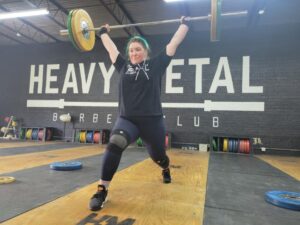
An incredibly affordable weightlifting shoe that’s good for one thing—weightlifting.
Product Brand: Reebok
Product Currency: $
Product Price: 110
Product In-Stock: InStock
4.39
Reebok Lifter PR 3: FAQs
Should you wear weightlifting shoes?
Weightlifting shoes can be a great way to add stability to your strength training. Two things a lifting shoe provides are a solid, stable base, and a raised heel, which will prove a more stable and comfortable position in deep squats for most people. Added stability for weightlifting shoes will also help you from wobbling on heavy reps, which can help you lift both safely and effectively.
Do Reebok Legacy Lifters run small?
In our experience, the latest Legacy Lifters did run a bit small, so our product tester recommends going up a half of a size in our Reebok Legacy Lifter 3 review.
Are the Reebok Lifter PR 3 lifting shoes good for squats?
The Reebok Lifter PR 3 shoes have a raised heel height of 15 millimeters, which will put you in a more comfortable and upright position during squats. That, with the added stable base, will help you in squats.
However, the heel height might be a bit low for someone with ankle mobility issues. Also, the PR 3 has a responsive midsole, which may affect your stability during maximal lifts. For the most part though, these will be an improvement compared to just typical gym sneakers.


